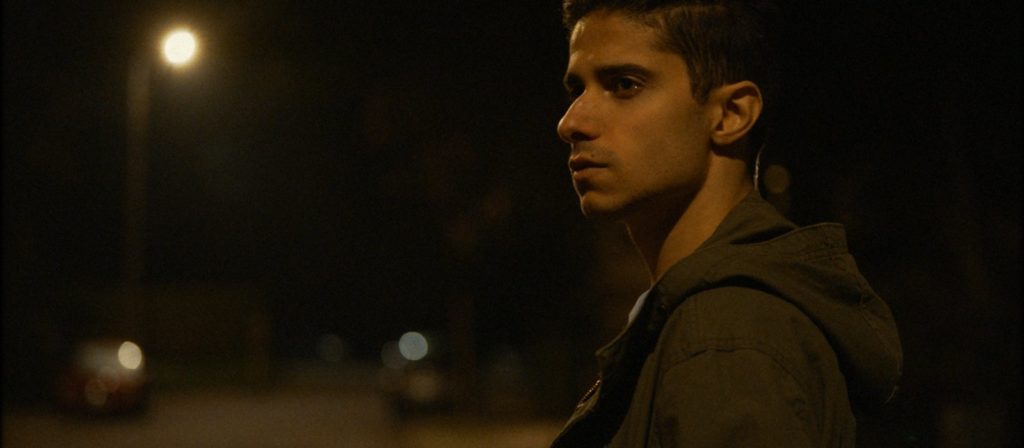《动物》,由比利时导演 Nabil Ben Yadir编自导,在根特影展首映,也在东北欧最大的电影节-塔林黑夜影展参与竞赛。本片改编比利时第一例官方记录的恐同攻击事件,年轻的穆斯林男子Ihsane Jarfi 在2012年被惨忍杀害。
《动物》以充满暖暖人情味的的家庭聚会为启幕,给予毫无戒心的观众一种虚假的安全感。 Brahim(Soufiane Chilah饰演)在他父母的郊区房子里为母亲过生日,而立之年的主角虽然受到家人和父母的爱戴,但依然躲不过尖锐的问候:「你什么时候结婚?」「你什么时候会带女朋友回家看看?」 。保守的宗教家庭从未让他表现过真正的自我。
晚餐继续进行,Brahim竭力扮演着孝顺的儿子,ㄧ边听着父亲秘密准备着对母亲的生日告白,一边等着男友,将要假借以工作伙伴的身份赶来,然而几个家庭成员似乎已经知道他的秘密。餐桌上欢乐的气氛,不敌导演暗示出餐桌下,充满敌意的环境,如同西洋棋盘上的棋子已经备好,一个漫长精神斗争的夜晚即将开启。
这样充满张力的叙事设计令人想到;这让人想起了艾玛-塞利格曼(Emma Seligman)精彩的的单场电影《Shiva Baby》,一个年轻的犹太女孩在参加传统的习瓦(犹太教的丧礼习俗)试图保守自己是Sugar baby第二身份。但是,与这部独立的美国电影相比,《动物》有一条更黑暗的道路,为Brahim安排了更可怕的命运。
Soufiane Chilah是位非常出色的演员,他的一举手,一投足都令人怜惜,活出主角Brahim的身份认同危机,在生活上的无助与尴尬。 Brahim是气宇轩昂的同性恋、虔诚的穆斯林教徒、同时也是渴望尊重父母而从未公布同性身份的乖儿子。悲惨的事实是,Brahim的多重身份互相对立,被自己的家人暗示,后被攻击者挑衅。
我们不知道为何主角在最安全的时候隐藏自己的身份,而在最危险的环境中又把它说出来。也许有一丝自我鞭策的意味,因为他明明可以跟家人吐露真相,但他有苦说不出。
在一次冲突后,Brahim逃离了生日聚会,去了市中心的一家同性恋俱乐部。在俱乐部外面,一辆车停了下来,车上有四个人在寻乐,他们喝醉了,他们想要找麻烦,他们骚扰过往的行人。 Brahim试图化解冲突,告诉四个大汉这是一家同性恋酒吧,而他知道 “有女孩的俱乐部 “在哪里。
起初,他对自己的同性恋身份保密。不过,最令人惊讶的是,Brahim决定跳上流氓的车。
他是想在他们开始闹事之前让他们尽可能地远离同性恋俱乐部吗?
他想惩罚自己吗?
他是否喜欢假装成异性恋,远离自己生活中的麻烦?
我们不知明确的答案,但是我们也跟着镜头上了赃车。

无论Brahim和这四个人上车时的动机是什么,我们可以确定一件事:悲剧已经写下。他不可能不尝屈辱地离开那辆车。随着夜幕的降临,紧张气氛加剧,四人像鲨鱼一样,在街道上乱窜,寻找鲜血。方形的4:3镜头向Brahim逼近,Brahim被迫成为萤幕上的客体,导演在使用越来越长的镜头时,他也变得越来越脆弱。 .
在不剧透的情况下,我只想说,导演不得不强行放弃Brahim的主观观点,因为他遭受到的暴力已经达到了使他无法说话、反应、移动和生存的程度。不只是主角失去主控能力,导演也强迫我们观看──用施暴男人的智能手机拍摄,只用摄像机的闪光灯照明──夜间田野里的私刑。
这出令人作呕的暴力事件几乎没有留给我们反思的时间,但有一点是显而易见的:《动物》展示了人性中最丑陋的一面,以及我们动物性行为的具体特征,这个特征可怕地存在于我们所有人的内心:不归点(一种我们原始面的沉没成本谬论)。一旦情况升级到一定的暴力程度,肇事者就会陷入无法阻止的嗜血狂潮。他们所谓的动机消失了,只剩下只有伤害另一个人的欲望。
《动物》是一部不需要使用特效的恐怖片,因为现实生活总是比阁楼里的怪物更可怕。如同这部影片叙说的,人总是知道如何伤害和仇恨给其他人,我们又怎么知道,我们会不会变为明天的Brahim,在痛苦的尖叫声中默默忍受,然后,沉默。
更令人震惊的是,《动物》还告诉我们,我们也可能是杀害Brahim的凶手。即使导演只谈论了恐惧同性恋的仇恨犯罪,但在令人不寒而栗的后记中,我们还看到,在对Brahim下手的四人中,有一个是信仰相同的穆斯林,另一个有一个同性恋的父亲。
《动物》这是一部强大的、令人生畏的电影,改编自现实生活中的犯罪事件,最终一名男子死亡,四名男子被终身监禁。电影虽然落幕了,但我却觉得故事中的痛苦跟恐惧还像是鲜血一样,在压抑的镜头外,流淌不止。

影评人简介
贝尔纳多·莱特(Bernardo Leyte),常驻巴黎的电影制作人。 他在西班牙、德国和英国长大,毕业于伦敦电影学院,目前担任导演。 他是一位充满热情的影迷,他所观看的电影囊括各种类型,从他的偶像斯坦利·库布里克(Stanley Kubrick)和安德烈·塔可夫斯基(Andrei Tarkovsky)的電影,到超级英雄、恐怖片、动漫等。
Animals, directed by Nabil Ben Yadir, premiered at the Ghent Film Festival this year
and was in competition at the Tallinn Black Nights Film Festival. Based on the true
story of a young gay muslim man who suffered a brutal attack in 2012, Ihsane Jarfi, it
is an unrelentingly violent chronicle of Belgium’s first official homophobic murder, and
it is sure to shock viewers with its intense realism when it is released.
Animals begins with a gentle touch and enough human warmth to lure the
unsuspecting viewer into a false sense of security. 30 year old Brahim (Soufiane
Chilah) is at his parents’ suburban house for his mother’s birthday. Though he is loved
by family and parents, Brahim is subjected to uncomfortable questions: “When will you
get married? When will you get a girlfriend?” The conservative religious beliefs held by
his family prevent him from revealing his true self, though he remains a loyal and
caring son to his father, who uses him as a test audience for the speech he will deliver
moments later to his mother. Meanwhile, his longtime boyfriend is on the way to the
house under the pretence of being a friend from work, and a couple of family members
seem to know his secret. The pieces seem to be laid out on the board for a long night
of tension and mental battles as the young man tries to navigate this usually warm but
now hostile environment; one is reminded of the brilliant single-location film Shiva
Baby, by Emma Seligman, where a young Jewish girl tries to keep some secrets of
her own while attending a traditional Shiva ceremony. But Animals has a darker road
ahead and a more terrible fate planned for Brahim than the indie American film.
Soufiane Chilah is fantastic in his performance, and he plays his character with
enthralling realism; all the contradictions of Brahim are alive within him at all times. He
is a handsome, gay muslim man who loves his parents but is pained by the lies he
feels forced to tell them to keep the status quo. He’s told, first by his family, and later
by his aggressors, that his faith and his homosexuality are offensively opposed, but
we see him be a fervent believer throughout the film. He’s sensitive but also strong.
He hides his identity when it is safest to say it, and blurts it out in the most dangerous
setting. We sense his absolute respect for his father even as he gets bombarded by
texts from his boyfriend while trying to listen to the rehearsed speech. We also notice,
perhaps, a hint of self-flagellation as he is told to just go in the house and tell everyone
the truth: he could, but he can’t.
After a confrontation, Brahim runs away from the birthday party and goes to a gay club
in the city center. Outside of the club, a car pulls up with four men looking for girls;
they are drunk and belligerent, as they harass the passers-by. Brahim tries to defuse
the situation by telling them the truth, that this is gay bar, and he knows where the
“clubs with the girls are”. At first, he keeps his homosexuality secret. The film’s most surprising character decision is when Brahim decides to board the car with the
hooligans. Is he trying to get them as far away from the gay club as possible before
they start any trouble? Does he want to punish himself? Does he enjoy pretending to
be heterosexual, away from the troubles of his own life? Real life can be frustratingly
hard to probe for definite answers.
Whatever Brahim’s motivations are at the point when he gets in the car with the four
men, one thing becomes immediately clear: he’s not going to be able to leave that car
without suffering, at the very least, deep humiliation. Whatever the men’s motivations
are, it is increasingly obvious as the night progresses that they are looking for blood.
The tension ratchets up and the square 4:3 cinematography closes in on Brahim. The
director stays firmly on his point of view throughout the events, using longer and
longer takes that make the protagonist more and more vulnerable.
Without spoiling the sequence of events that follow, suffice it to say that the director
has to forcibly abandon Brahim’s subjective point of view as the violence towards him
reaches a point that renders him unable to speak, react, move, survive. We are
invited, against our will, to a lynching in a field at night, shot with the men’s
smartphones, lit only by the camera’s flash light. The sickening violence leaves little
time for reflexion, but one thing is obvious: Animals shows the ugliest side of human
nature, and a very specific trait of our animalistic behaviour that is, frighteningly, inside
all of us: the point of no return ( a sort of sunk cost fallacy of our primal side) . Once
the situation escalates to a certain level of violence, the perpetrators go into a blood-
thirsty frenzy that cannot be stopped. Their so-called motives fade and only the desire
to hurt another human being remains.
Animals is a horror film that doesn’t need to use any genre trappings because real life
is always more scary than any monsters in the attic. To see humans bring the level of
hatred and pain to other humans that we are shown in this film is far more frightening
because we know that, in another world, we could easily be Brahim, suffering in
silence before the agonic screams and then, again, silence. Even more alarmingly,
Animals tells us something else; we could also be Brahim’s killers. Yes, this film deals
specifically with a homophobic hate crime, but we are also shown, in the chilling
epilogue, that, among the men who did this to Brahim, one is of the same Muslim faith
and another one has a homosexual father. Animals may be based on real life events
that ended up with one dead man and four men in prison for life, but knowing the
resolution does not feel like a good enough answer. This is a powerful, intimidating
film that dares to leave the biggest question hanging in the air: Why?

About the Author
Bernardo Leyte (Vigo, Spain) is a Paris-based filmmaker. He grew up in Spain, Germany and the UK, graduating as a director from the London Film School. He is a passionate cinephile whose eclectic film playlist includes a bit of everything, from his idols, Kubrick and Tarkovsky, to superheroes, horror, anime and everything in between.

